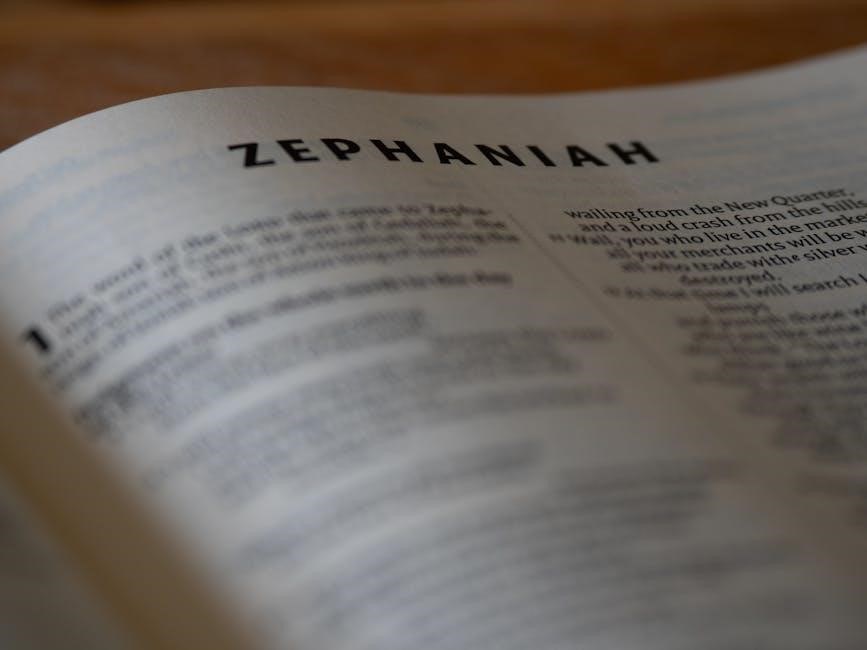Eschatology explores the ultimate destiny of humanity, examining themes of finality, transformation, and the culmination of existence across religious, philosophical, and cultural frameworks.
1.1 Definition and Scope of Eschatology
Eschatology is the theological study of the end times, focusing on humanity’s ultimate destiny, cosmic culmination, and divine purposes. It encompasses themes like the end of the world, final judgment, resurrection, and afterlife, exploring both individual and collective destinies. Rooted in religious traditions, eschatology examines existential questions about time, purpose, and ultimate meaning, offering frameworks to understand human existence within a broader cosmic narrative.

1;2 Historical Context and Development
Eschatology has evolved across centuries, shaped by religious, cultural, and philosophical traditions. Ancient civilizations often linked eschatological ideas to cosmic events and divine plans. In religious contexts, Judaism, Christianity, and Islam developed distinct eschatological frameworks, with concepts like messianic redemption, the Second Coming, and the Day of Judgment. Over time, these ideas were refined through theological debates and influenced by historical events, leading to diverse interpretations. The study of eschatology remains a dynamic field, reflecting humanity’s enduring quest to understand ultimate purposes and destinies.
1.3 Importance in Religious and Philosophical Discourse
Eschatology holds profound significance in religious and philosophical thought, addressing humanity’s ultimate questions about existence, purpose, and destiny. It provides a framework for understanding divine plans, moral accountability, and the meaning of history. In religious contexts, it often serves as a source of hope, guidance, and ethical motivation. Philosophically, it explores themes of existence, teleology, and the human condition. By grappling with these issues, eschatology bridges theology, ethics, and metaphysics, offering insights into life’s ultimate mysteries and shaping both individual and collective worldviews.

Key Themes in Eschatology

Eschatology examines ultimate transformation, destiny, and ethical frameworks, exploring cosmic events, divine plans, and humanity’s role in the culmination of existence and time;
2.1 The Concept of the End Times

The concept of the End Times refers to the ultimate culmination of history, often linked to transformative events like cosmic upheavals or divine interventions. It explores themes of finality, renewal, and destiny, varying across religious and philosophical traditions. Some interpretations emphasize a cataclysmic end, while others envision a gradual transition to a new order. The idea of the End Times often carries moral and existential significance, reflecting humanity’s curiosity about its purpose and the universe’s ultimate fate.

2.2 Death, Judgment, and the Afterlife
Death, judgment, and the afterlife are central to eschatological thought, addressing humanity’s ultimate questions. Death marks the end of mortal existence, while judgment involves divine evaluation of deeds. The afterlife, whether eternal reward or punishment, reflects beliefs about justice and destiny. These concepts vary across traditions, with some emphasizing moral accountability and others focusing on divine grace. They shape beliefs about purpose, ethics, and the human soul’s enduring nature, offering meaning to life’s transient journey.
2.3 The Nature of the Divine Plan
The divine plan in eschatology refers to the ultimate purpose and design of the universe, often attributed to a higher power or deity. It encompasses the progression of events leading to the final destiny of creation. This concept varies across traditions, with some viewing it as a preordained path and others as an unfolding process shaped by divine will. The divine plan is central to understanding eschatological themes, offering insight into the meaning and purpose of existence, and the ultimate resolution of cosmic and human dilemmas.
2.4 The Role of Humanity in Eschatological Events
Humanity plays a pivotal role in eschatological events, often depicted as both participants and recipients of divine culmination. Many traditions emphasize human agency, where moral choices and actions influence the unfolding of the end times. Free will and collective responsibility are central themes, with humanity’s decisions shaping the trajectory of cosmic events. While some eschatologies portray humanity as passive recipients of divine judgment, others highlight active participation in ushering in the final redemption. This duality underscores the complex interplay between human action and divine purpose in eschatological narratives.

Religious Perspectives on Eschatology
Religious perspectives on eschatology vary widely, with each tradition offering unique insights into the end times. These beliefs reflect deeply held theological convictions and cultural influences, exploring themes of divine purpose, final judgment, and humanity’s ultimate destiny.
3.1 Christian Eschatology: The Second Coming and Apocalypse

Christian eschatology centers on the Second Coming of Jesus Christ, marking the culmination of history. It includes events like the resurrection of the dead, final judgment, and the establishment of God’s eternal kingdom. The Apocalypse, as described in Revelation, symbolizes the ultimate triumph of good over evil. Believers anticipate a new heavens and earth, emphasizing redemption and eternal life. These teachings profoundly shape Christian hope, offering a vision of divine justice and the fulfillment of God’s plan for humanity.
3.2 Islamic Eschatology: The Day of Judgment and Mahdi
Islamic eschatology revolves around the Day of Judgment (Qiyamah), a divine reckoning where all souls face judgment based on their deeds. Key events include the arrival of the Mahdi, a righteous leader who will restore justice, and the appearance of Dajjal, a deceptive figure opposing the Mahdi. Believers are called to uphold faith and righteousness amid these trials. The ultimate promise is paradise for the faithful and divine justice for all, emphasizing accountability and eternal life in God’s presence.
3.3 Jewish Eschatology: The Messiah and the World to Come
Jewish eschatology centers on the arrival of the Messiah, a righteous leader descended from King David, who will usher in a golden age of peace and prosperity. This era, known as the World to Come (Olam Ha-Ba), will witness the ingathering of exiles, the resurrection of the dead, and the rebuilding of the Temple in Jerusalem. Emphasizing ethical living and divine justice, Jewish eschatology envisions a harmonious world under God’s sovereignty, where humanity fulfills its spiritual and moral potential.
Philosophical Debates in Eschatology
Philosophical debates in eschatology explore fundamental questions about existence, purpose, and finality. They examine tensions between human freedom, divine justice, and the ultimate destiny of creation.
4.1 Free Will vs. Determinism in Eschatological Scenarios
Eschatological debates often grapple with the interplay between free will and determinism. Determinism suggests that the end times are preordained, while free will posits human agency in shaping the future. This tension raises questions about divine sovereignty, moral responsibility, and the nature of destiny. Religious traditions vary in their emphasis, with some asserting a predetermined plan and others highlighting human choices as pivotal in eschatological outcomes, creating a complex dialogue between fate and freedom.
4.2 The Problem of Evil and the End Times
The problem of evil poses a significant challenge to eschatological thought, questioning how suffering and injustice align with divine plans for the end times. Religious traditions often address this paradox by framing evil as a test of faith or a consequence of free will. Eschatological narratives frequently envision evil’s ultimate defeat, restoring justice and harmony. However, the persistence of evil raises ethical dilemmas, prompting theological debates about the nature of God, human morality, and the purpose of eschatological resolution.

Cultural and Historical Impact of Eschatology
Eschatology has profoundly shaped cultural beliefs, inspired movements, and influenced artistic expression, reflecting humanity’s enduring fascination with destiny and the interplay of hope and fear.
5.1 Eschatology in Art and Literature
Eschatology has inspired profound works in art and literature, reflecting humanity’s fascination with the end times. From biblical apocalyptic imagery in paintings to dystopian novels, themes of final judgment, redemption, and cosmic transformation resonate deeply. Literature often explores existential questions, while art visually interprets the sublime and terrifying aspects of eschatological visions. These creative expressions not only mirror cultural anxieties but also offer hope and introspection, making eschatology a timeless muse for artists and writers across centuries.
5.2 The Influence of Eschatology on Social Movements
Eschatology has profoundly shaped social movements throughout history, often inspiring collective action driven by beliefs in an impending divine plan or final reckoning. Millenarian movements, such as the Crusades or modern apocalyptic groups, have mobilized millions, blending religious conviction with social and political agendas. These movements often aim to hasten or prepare for the end times, reflecting a mix of hope, fear, and a desire to align human efforts with perceived cosmic purposes. Eschatological ideas continue to influence contemporary activism, from environmentalism to political extremism.
Modern Relevance of Eschatology
Eschatology remains relevant in modern times, offering insights into global challenges, existential questions, and humanity’s ultimate purpose, influencing culture, theology, and individual beliefs about the future.
6.1 Eschatology in Contemporary Theology
Contemporary theology engages eschatology by reinterpreting traditional doctrines in light of modern challenges, such as environmental crisis, social justice, and interfaith dialogue. Themes like the kingdom of God, divine judgment, and ultimate redemption are recontextualized to address global issues. Progressive theologians emphasize hope, transformation, and the active role of humanity in shaping a just future. Meanwhile, conservative traditions often reaffirm literal interpretations of eschatological texts. This dynamic interplay reflects the evolving nature of theological thought in response to cultural and ethical shifts, ensuring eschatology remains a vital area of study and reflection.
6.2 The Role of Science and Technology in Shaping Eschatological Thought
Science and technology have significantly influenced eschatological thought by offering new perspectives on humanity’s destiny. Advances in fields like artificial intelligence, space exploration, and biotechnology challenge traditional views of the end times. While some see technological progress as a path to immortality or cosmic transcendence, others fear it may lead to existential risks. These developments prompt reevaluations of apocalypse scenarios, divine plans, and humanity’s role in shaping the future. Science thus becomes a catalyst for both hope and anxiety in modern eschatological discourse.

Challenges and Criticisms of Eschatology
Eschatology faces criticism for its speculative nature, lack of empirical evidence, and potential to inspire fear or harm. Its interpretations often conflict across cultures and religions, sparking debates about its relevance and ethical implications.
7.1 Critiques of Eschatological Doctrines
Eschatological doctrines often face criticism for promoting deterministic views, fostering fear, and encouraging passive behavior. Critics argue these teachings can lead to exclusionary beliefs, marginalization, and even violence. Additionally, the emphasis on divine judgment may undermine human agency and ethical responsibility. Some scholars question the lack of empirical support and the subjective nature of interpretations, highlighting potential misuses of eschatology to manipulate or control populations. These critiques challenge the validity and ethical implications of eschatological frameworks in modern contexts.
7.2 The Diversity of Eschatological Beliefs Across Cultures
Eschatological beliefs vary widely across cultures, reflecting diverse theological, philosophical, and societal values. While some traditions envision a catastrophic end, others, like Hinduism, see cycles of creation and destruction. Indigenous cultures often emphasize harmony with nature over apocalyptic scenarios. These beliefs influence communal identity, ethical systems, and views of time. Despite differences, many share themes of judgment, renewal, or transformation, underscoring humanity’s universal fascination with ultimate destiny. This diversity enriches global conversations about meaning, purpose, and the future.
Eschatology, as explored throughout this text, is a rich and complex field that delves into humanity’s ultimate destiny. It bridges theology, philosophy, and culture, offering insights into existential questions about endings, renewal, and purpose. By examining diverse beliefs across traditions, eschatology highlights our shared fascination with the future and the meaning of existence. Its relevance persists in contemporary discourse, challenging individuals to reflect on their place within the grand narrative of time. This concluding section encapsulates the essence of eschatology’s enduring significance.